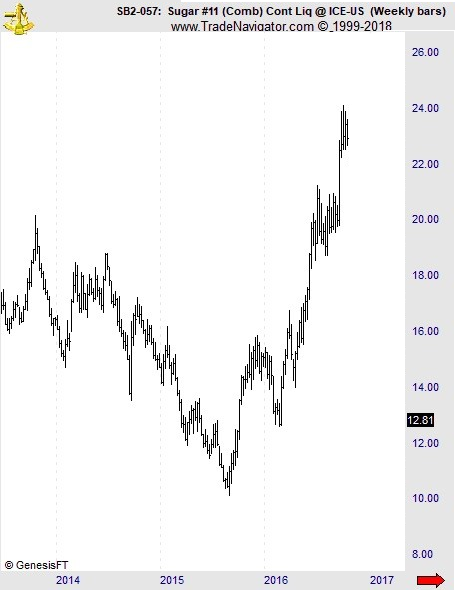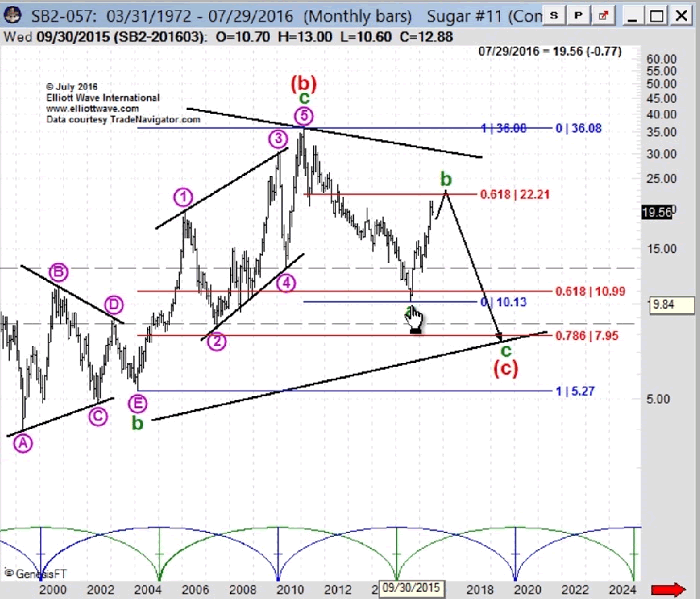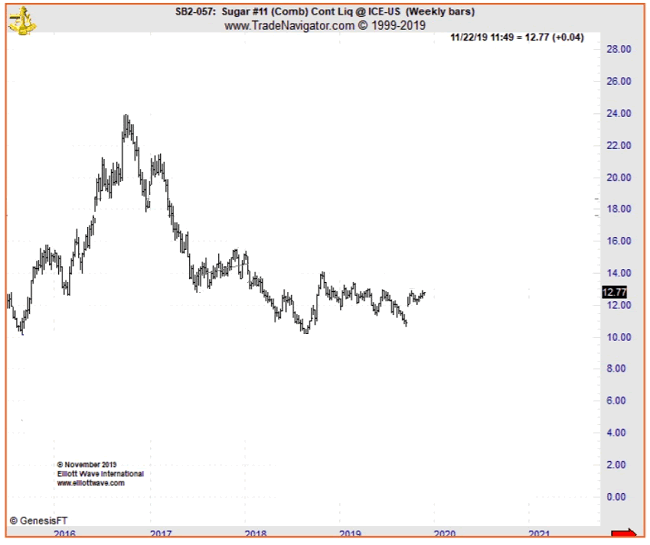Want to Identify Market Trends? Watch Elliott Wave Analysis at Work
InvestorEducation / Elliott Wave Theory Nov 26, 2019 - 06:56 PM GMTBy: EWI
How it anticipated a multi-year crash in one of the world's biggest commodity markets
The large fowl we call "Turkeys" were given that name by the British, who thought the bird came from the country of Turkey. Truth is, turkeys are native to North America. And yet, the question no one will ever hear around the dinner table on Thanksgiving is, "Who wants gravy on their North America?"
This story recalls another fallacy -- or fowl-acy! -- that likewise persists in the face of facts to the contrary; namely, the mainstream financial theory known as "fundamental market analysis." The notions behind this widely held belief go like this:
Financial market prices are driven by external events, or "fundamentals," which can include crop-destroying weather patterns, political unrest, earnings reports, crop data, supply and demand numbers and so on.
This theory is as old as the name "turkey," and as commonly accepted!
Yet, our friends at Elliott Wave International have a birds-eye view into a very different way of interpreting market behavior. The "bible" on all things Elliott is Frost and Prechter's classic Elliott Wave Principle -- Key to Market Behavior (EWP, for short), which provides this ground-breaking counterclaim:
"Sometimes the market appears to reflect outside conditions and events, but at other times it is entirely detached from what most people assume are causal conditions. The reason is that the market has a law of its own. It is not propelled by the external causality to which one becomes accustomed in the everyday experiences of life.
"The path of prices is not a product of news."
What "law of its own" does the market follow? EWP continues:
"The market's progression unfolds in waves. Waves are patterns of directional movement. Each pattern has identifiable requirements as well as tendencies. The Wave Principle is the only method of analysis that also provides rules and guidelines for forecasting."
To understand Elliott wave analysis at work in actual world markets, let's review the recent history in an often-volatile commodity markets: sugar.
This chart captures the huge rally in sugar prices during 2015-2016, an 80% increase which earned sugar the title of "best-performer of all commodities that trade on U.S. exchanges." (Oct. 3, 2016 Seeking Alpha)

At its peak in mid-September 2016, sugar prices orbited a four-year high. And, thanks to a raft of bullish "fundamentals" -- such as rising demand, falling supplies, and a drought in Brazil -- all mainstream signs pointed to sweeter gains for the sweet soft.
- "The multiyear [sugar] bear turns bull. The second year of deficit can launch the sweet commodity even higher." Aug. 15 Seeking Alpha
- "Sugar prices hit four-year high on supply concerns. Prices have started rising in full swing." Oct. 4 Nikkei Asian Review
- "A sweet market for sugar bulls. The fundamentals that drove the rise in prices earlier this year have remained largely unchanged." Sept. 16 Financial Times
Yet -- instead of the trend heading even higher, sugar prices collapsed in a two-year long bear market that pushed prices to the lowest lows in a decade, before pausing in late September 2018.
Notably, sugar's selloff went entirely against its fundamental script.
It did, however, follow its Elliott wave script to a T.
See, in the July 21, 2016 Monthly Commodity Junctures, Elliott Wave International's chief commodity analyst Jeffrey Kennedy outlined a long-term bearish path for sugar that would unfold in two main phases. Jeffrey explained:
"We're currently working wave b. I wouldn't be surprised to see this advance continue into September or even October of this year ... to an objective of 22.89.
"Once wave b finishes, I will then look for a significant decline that should last for a number of years and easily push prices well below the low we experienced in 2015 at 10.13."

The next chart captures the aftermath. Sugar rallied above Jeff's cited target into mid-September, before succumbing to the two-year long bear market that saw prices do a complete 180-degree reversal into the "worst-performing commodity" of 2018.

Most of the time, a market's price action unfolds in one of the five core Elliott wave patterns. For the first time since its 1978 release, Elliott Wave International is giving away Elliott Wave Principle -- Key to Market Behavior, so investors can keep the path toward market forecasts clear of news-related obstacles.
The early turkey catches the worm! Get instant access to Elliott Wave Principle -- Key to Market Behavior, the timeless bestseller and ultimate resource guide today!
© 2005-2022 http://www.MarketOracle.co.uk - The Market Oracle is a FREE Daily Financial Markets Analysis & Forecasting online publication.



